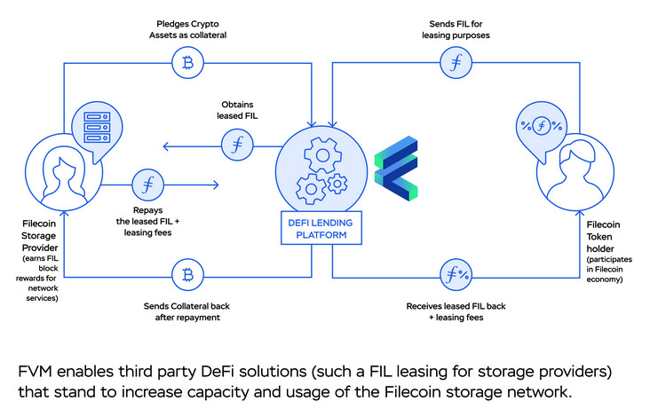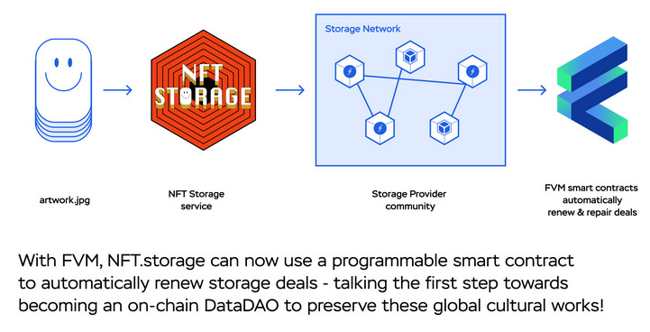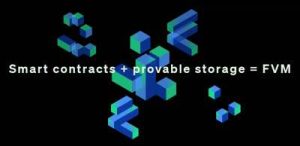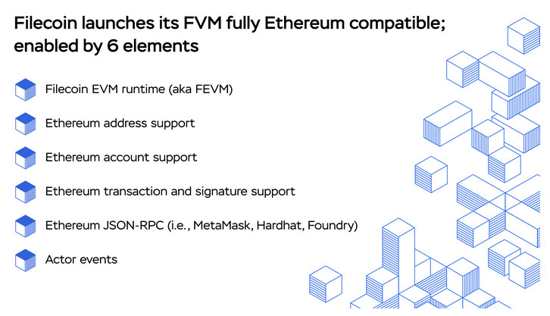Filecoin VM Launches Decentralized Compute and Unlock Potential of Open Data Economy
New layer 1 smart contract capabilities to bring user programmability to Filecoin
This is a Press Release edited by StorageNewsletter.com on March 22, 2023 at 2:01 pmFilecoin Virtual Machine (FVM), an execution environment for smart contracts on the Filecoin network, is live on the Filecoin mainnet.
The FVM launch adds smart contracts and user programmability to the Filecoin blockchain, unlocking the potential of an open data economy.
With FVM, developers can write and deploy custom code to run on the Filecoin blockchain, allowing them to connect, augment, and innovate around the building blocks of the Filecoin economy: storage, retrieval, and computation of content-addressed data at scale. This represents an advancement in the capabilities of decentralized storage.
FVM’s features will increase the utility and value of the Filecoin network, a unique economy of 3,800+ storage provider systems WW. Together, these systems contribute over 13EB of storage capacity to the network, secure hundreds of terabytes of client data with more than 130 million FIL locked of collateral, and earn block rewards and income from storage deals.
Today’s introduction of the FVM is part of the company’s larger roadmap, which aims to democratize the services of today’s centralized cloud into open-access markets.
Juan Benet, CEO and founder, Protocol Labs, said: “FVM is a major step forward for blockchains and Web3 – it enables developers to build new kinds of applications, bringing the powers of smart contracts to large scale data.”
 FVM creates boundless opportunities, ranging from Data DAOs, perpetual storage, decentralized finance (DeFi), and Layer 2 networks, such as reputation systems, incentive-aligned content delivery networks, and more. FVM will empower builders to create entirely new categories of custom apps, markets, and organizations built around data stored on Filecoin.
FVM creates boundless opportunities, ranging from Data DAOs, perpetual storage, decentralized finance (DeFi), and Layer 2 networks, such as reputation systems, incentive-aligned content delivery networks, and more. FVM will empower builders to create entirely new categories of custom apps, markets, and organizations built around data stored on Filecoin.
These include:
-
Data onboarding and management: FVM provides the building blocks for new models of data management, such as automating storage deals to preserve data forever, establish data DAOs, or verify data integrity.
-
Network participant discovery and reputation: FVM storage provider reputation services or data retrievability oracles that create differentiation opportunities and enhance the reliability of the decentralized cloud.
-
Decentralized finance and other services to provide access to collateral for the storage providers offering services on the network and to create new opportunities for token holders to participate more actively in the Filecoin economy.
-
Data curation: Tools facilitating the collective creation, curation, and monetization of valuable datasets.
-
Cross-chain interoperability and integration: For example, cross-chain bridges to integrate with other economies or NFT-standards with built-in storage guarantees.
FVM launch brings additional integrations and support from leading Web3 platforms, including:
-
Sushi is one widely used decentralized cryptocurrency exchanges, with support for 10+ blockchains and thousands of tokens. With its FVM integration, users can easily perform automated swaps between FIL and thousands of other tokens, including wUSDC, wBTC, and wETH.
-
Brave, the privacy-focused browser with over 54 million monthly active users, is adding FVM support to its native wallet. Brave Wallets can now be used to authenticate or transact with FVM-powered apps through the Brave browser.
-
Celer is a zero-fee cross-chain interface that brings token and arbitrary message exchange to Filecoin, connecting it with 43 chains.
-
Axelar brings secure interchain communication to Filecoin. Using Axelar’s General Message Passing, dApps can now integrate FVM services, such as perpetual storage contracts, giving users one-click access to decentralized data across 30+ chains, spanning Cosmos, Binance, and Ethereum ecosystems.
 Jared Grey, CEO, Sushi, said: “We’re thrilled to integrate with FVM and leverage its powerful smart contract capabilities to enhance the user experience on Sushiswap. With FVM, we can unlock new frontiers for decentralized finance and offer our users even more innovative and efficient solutions. We’re excited to continue collaborating with the Filecoin network and building the future of Web3 together.”
Jared Grey, CEO, Sushi, said: “We’re thrilled to integrate with FVM and leverage its powerful smart contract capabilities to enhance the user experience on Sushiswap. With FVM, we can unlock new frontiers for decentralized finance and offer our users even more innovative and efficient solutions. We’re excited to continue collaborating with the Filecoin network and building the future of Web3 together.”
Brian Bondy, co-founder and CTO, Brave, said: “We are excited to build upon Brave’s existing support for Filecoin and IPFS with the launch of FVM, offering more ways to build and interact with the decentralized Web.”
Sergey Gorbunov, co-founder, Axelar, said: “The Axelar-Filecoin integration is one of the first use-cases of interoperability that enables composition of chains with different properties. For instance, DeFi across blockchains will be composable with decentralized storage, regardless of where they choose to build.”
Over 150 applications are building with FVM’s perpetual storage and other capabilities on the Hyperspace testnet, with plans to deploy to Mainnet.
These include:
-
Ocean is launching the first data marketplace on FVM, allowing individuals to make their curated datasets available for others to access. This platform offers an opportunity for data providers to reach a broader audience and share their valuable data with others who can benefit from it.
-
NFT.Storage is a storage service with over 100 million NFTs stored on Filecoin and preserved for public access. Now with FVM, those NFTs will be perpetually stored with automatically-renewing storage deals.
-
Waterlily is an AI-powered art bot that sends token rewards to the original artists, tackling the attribution and payments challenges important to ethical AI. It’s built with Bacalhau’s Lilypad, a bridge between on-chain and off-chain compute that lets you run decentralized compute jobs from FVM smart contracts.
Resources:
Introduction to FVM
Blog : FVM is live on Mainnet
Introduction to Filecoin















 Subscribe to our free daily newsletter
Subscribe to our free daily newsletter

